Orientation for Success: Reflective Learning and Feedback Essay
VerifiedAdded on 2023/06/07
|8
|2703
|321
Essay
AI Summary
This essay examines the significance of reflective learning, emphasizing its role in enhancing critical thinking and performance. It explores the Gibbs model, a structured approach to reflective learning, outlining its six stages and their contribution to understanding experiences, analyzing situations, and developing action plans. The essay further delves into the concepts of feedback and feedforward, highlighting their importance in formative and summative assessments. It differentiates between feedback, which provides evaluations, and feedforward, which offers solutions for improvement. The essay underscores how these elements contribute to the learner's ability to assess their performance, identify gaps, and enhance their future academic endeavors.
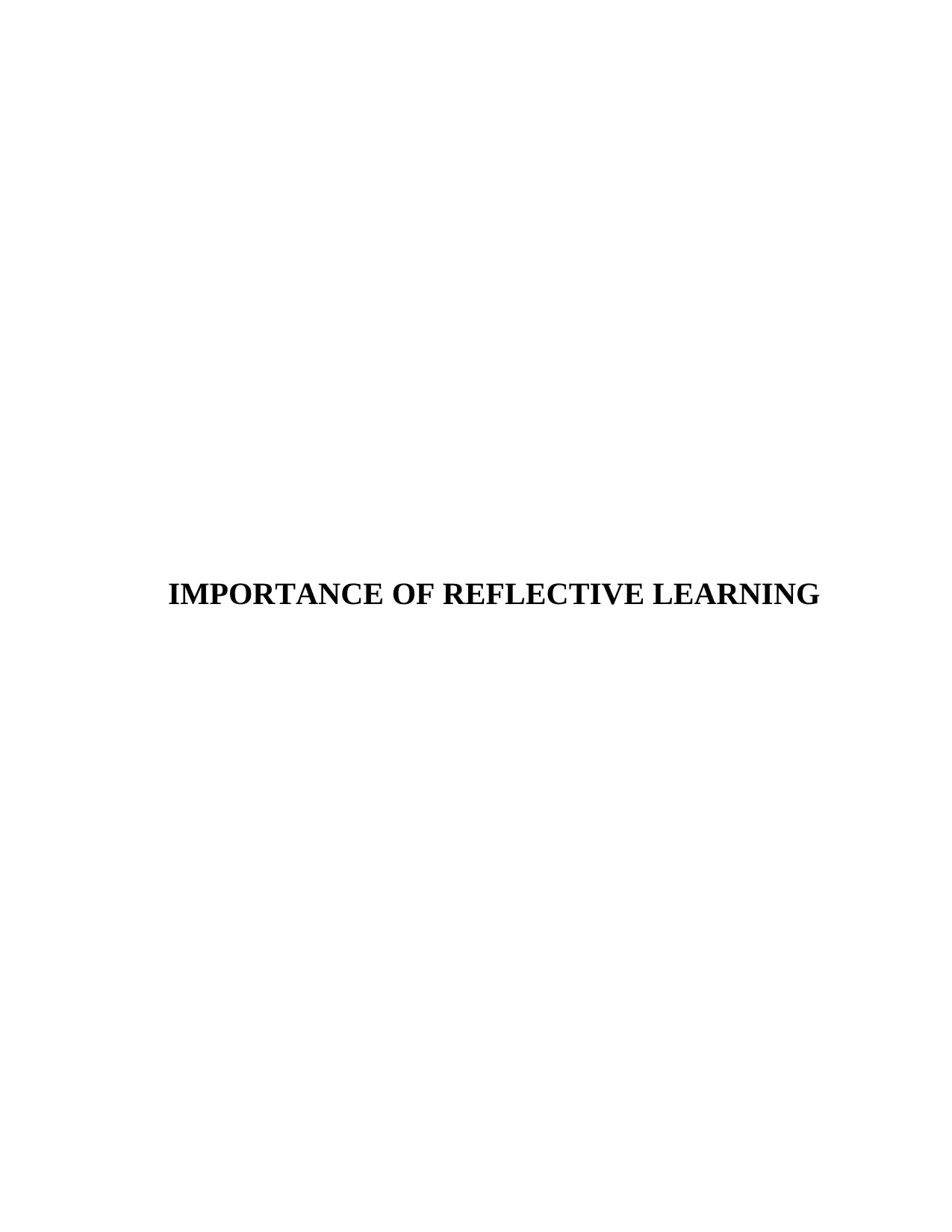
IMPORTANCE OF REFLECTIVE LEARNING
Paraphrase This Document
Need a fresh take? Get an instant paraphrase of this document with our AI Paraphraser
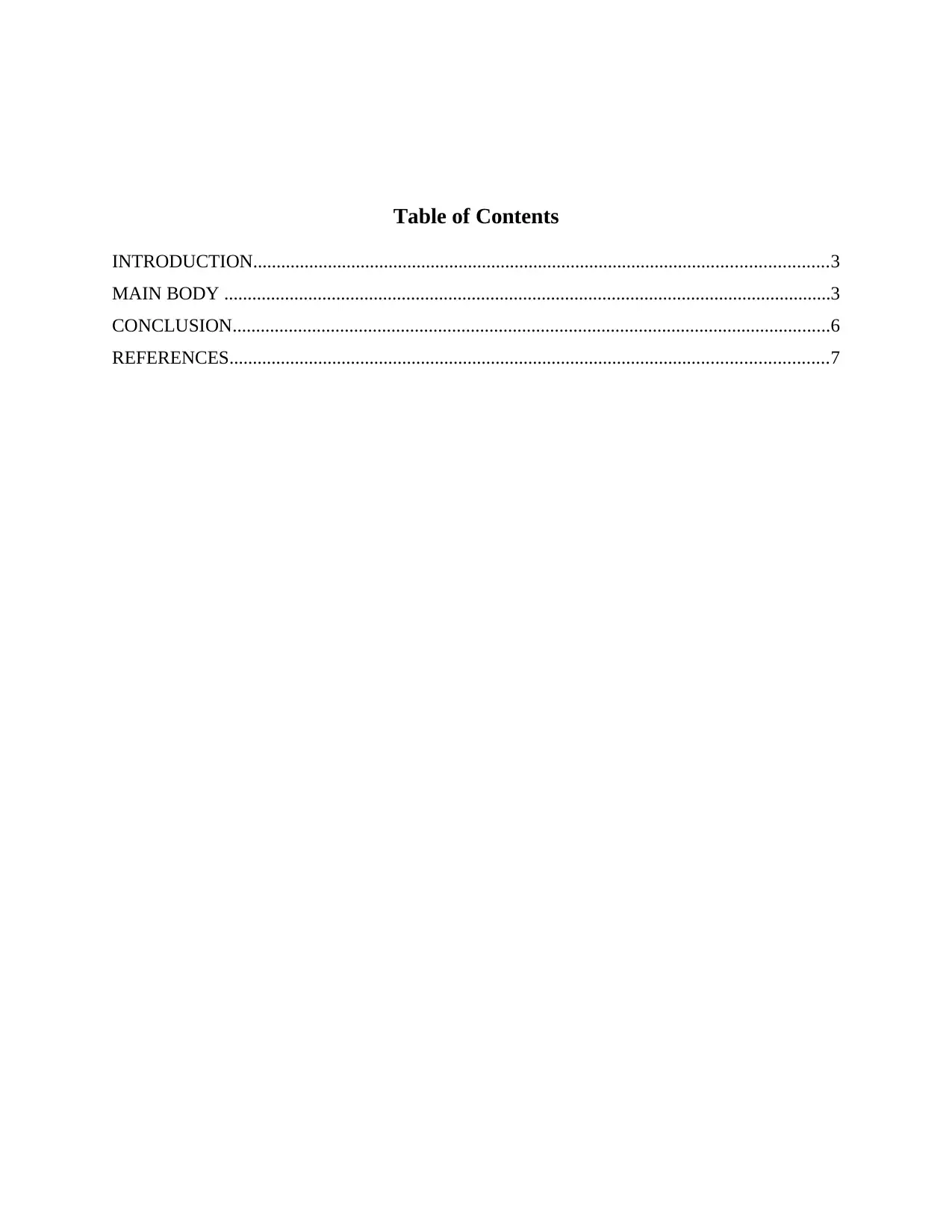
Table of Contents
INTRODUCTION...........................................................................................................................3
MAIN BODY ..................................................................................................................................3
CONCLUSION................................................................................................................................6
REFERENCES................................................................................................................................7
INTRODUCTION...........................................................................................................................3
MAIN BODY ..................................................................................................................................3
CONCLUSION................................................................................................................................6
REFERENCES................................................................................................................................7
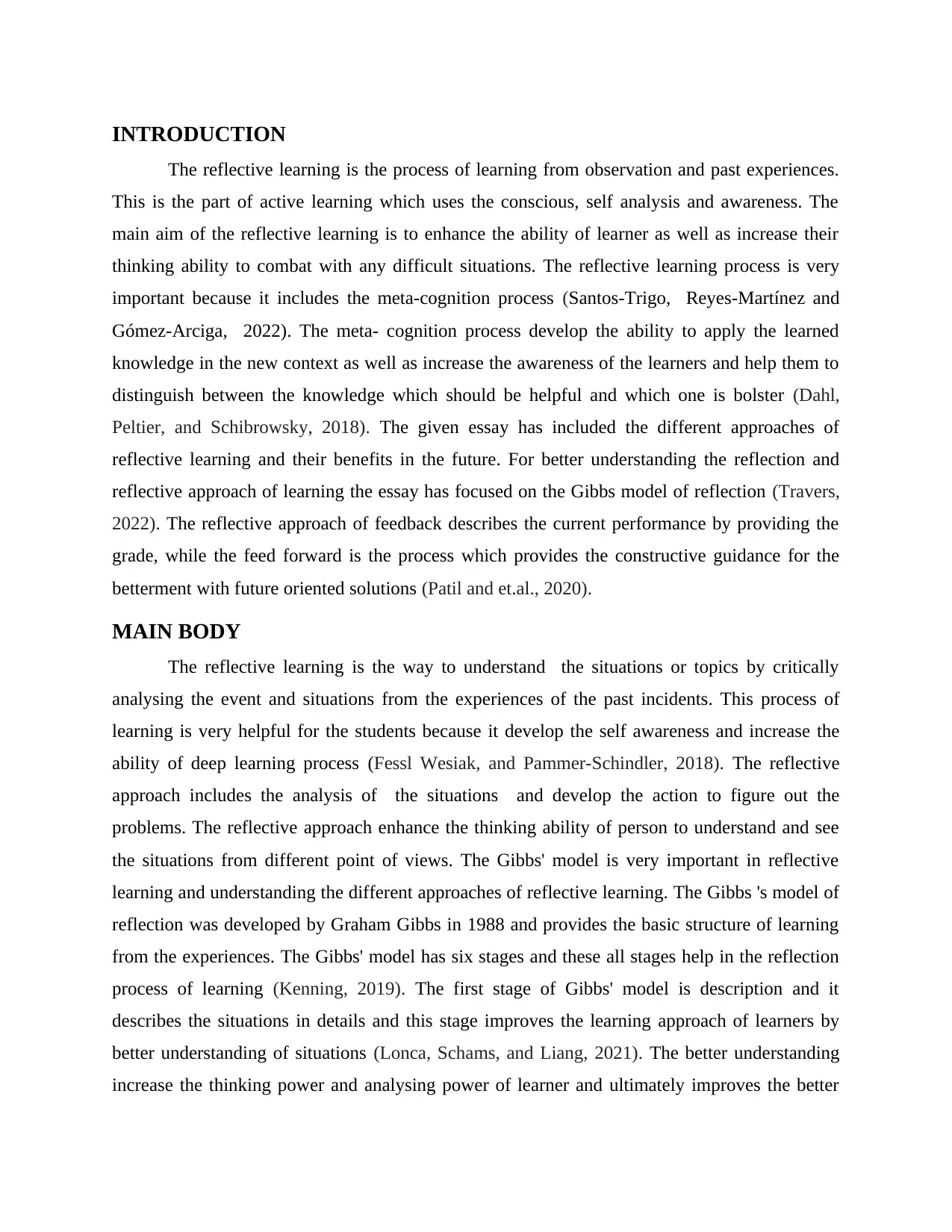
INTRODUCTION
The reflective learning is the process of learning from observation and past experiences.
This is the part of active learning which uses the conscious, self analysis and awareness. The
main aim of the reflective learning is to enhance the ability of learner as well as increase their
thinking ability to combat with any difficult situations. The reflective learning process is very
important because it includes the meta-cognition process (Santos-Trigo, Reyes-Martínez and
Gómez-Arciga, 2022). The meta- cognition process develop the ability to apply the learned
knowledge in the new context as well as increase the awareness of the learners and help them to
distinguish between the knowledge which should be helpful and which one is bolster (Dahl,
Peltier, and Schibrowsky, 2018). The given essay has included the different approaches of
reflective learning and their benefits in the future. For better understanding the reflection and
reflective approach of learning the essay has focused on the Gibbs model of reflection (Travers,
2022). The reflective approach of feedback describes the current performance by providing the
grade, while the feed forward is the process which provides the constructive guidance for the
betterment with future oriented solutions (Patil and et.al., 2020).
MAIN BODY
The reflective learning is the way to understand the situations or topics by critically
analysing the event and situations from the experiences of the past incidents. This process of
learning is very helpful for the students because it develop the self awareness and increase the
ability of deep learning process (Fessl Wesiak, and Pammer-Schindler, 2018). The reflective
approach includes the analysis of the situations and develop the action to figure out the
problems. The reflective approach enhance the thinking ability of person to understand and see
the situations from different point of views. The Gibbs' model is very important in reflective
learning and understanding the different approaches of reflective learning. The Gibbs 's model of
reflection was developed by Graham Gibbs in 1988 and provides the basic structure of learning
from the experiences. The Gibbs' model has six stages and these all stages help in the reflection
process of learning (Kenning, 2019). The first stage of Gibbs' model is description and it
describes the situations in details and this stage improves the learning approach of learners by
better understanding of situations (Lonca, Schams, and Liang, 2021). The better understanding
increase the thinking power and analysing power of learner and ultimately improves the better
The reflective learning is the process of learning from observation and past experiences.
This is the part of active learning which uses the conscious, self analysis and awareness. The
main aim of the reflective learning is to enhance the ability of learner as well as increase their
thinking ability to combat with any difficult situations. The reflective learning process is very
important because it includes the meta-cognition process (Santos-Trigo, Reyes-Martínez and
Gómez-Arciga, 2022). The meta- cognition process develop the ability to apply the learned
knowledge in the new context as well as increase the awareness of the learners and help them to
distinguish between the knowledge which should be helpful and which one is bolster (Dahl,
Peltier, and Schibrowsky, 2018). The given essay has included the different approaches of
reflective learning and their benefits in the future. For better understanding the reflection and
reflective approach of learning the essay has focused on the Gibbs model of reflection (Travers,
2022). The reflective approach of feedback describes the current performance by providing the
grade, while the feed forward is the process which provides the constructive guidance for the
betterment with future oriented solutions (Patil and et.al., 2020).
MAIN BODY
The reflective learning is the way to understand the situations or topics by critically
analysing the event and situations from the experiences of the past incidents. This process of
learning is very helpful for the students because it develop the self awareness and increase the
ability of deep learning process (Fessl Wesiak, and Pammer-Schindler, 2018). The reflective
approach includes the analysis of the situations and develop the action to figure out the
problems. The reflective approach enhance the thinking ability of person to understand and see
the situations from different point of views. The Gibbs' model is very important in reflective
learning and understanding the different approaches of reflective learning. The Gibbs 's model of
reflection was developed by Graham Gibbs in 1988 and provides the basic structure of learning
from the experiences. The Gibbs' model has six stages and these all stages help in the reflection
process of learning (Kenning, 2019). The first stage of Gibbs' model is description and it
describes the situations in details and this stage improves the learning approach of learners by
better understanding of situations (Lonca, Schams, and Liang, 2021). The better understanding
increase the thinking power and analysing power of learner and ultimately improves the better
⊘ This is a preview!⊘
Do you want full access?
Subscribe today to unlock all pages.

Trusted by 1+ million students worldwide
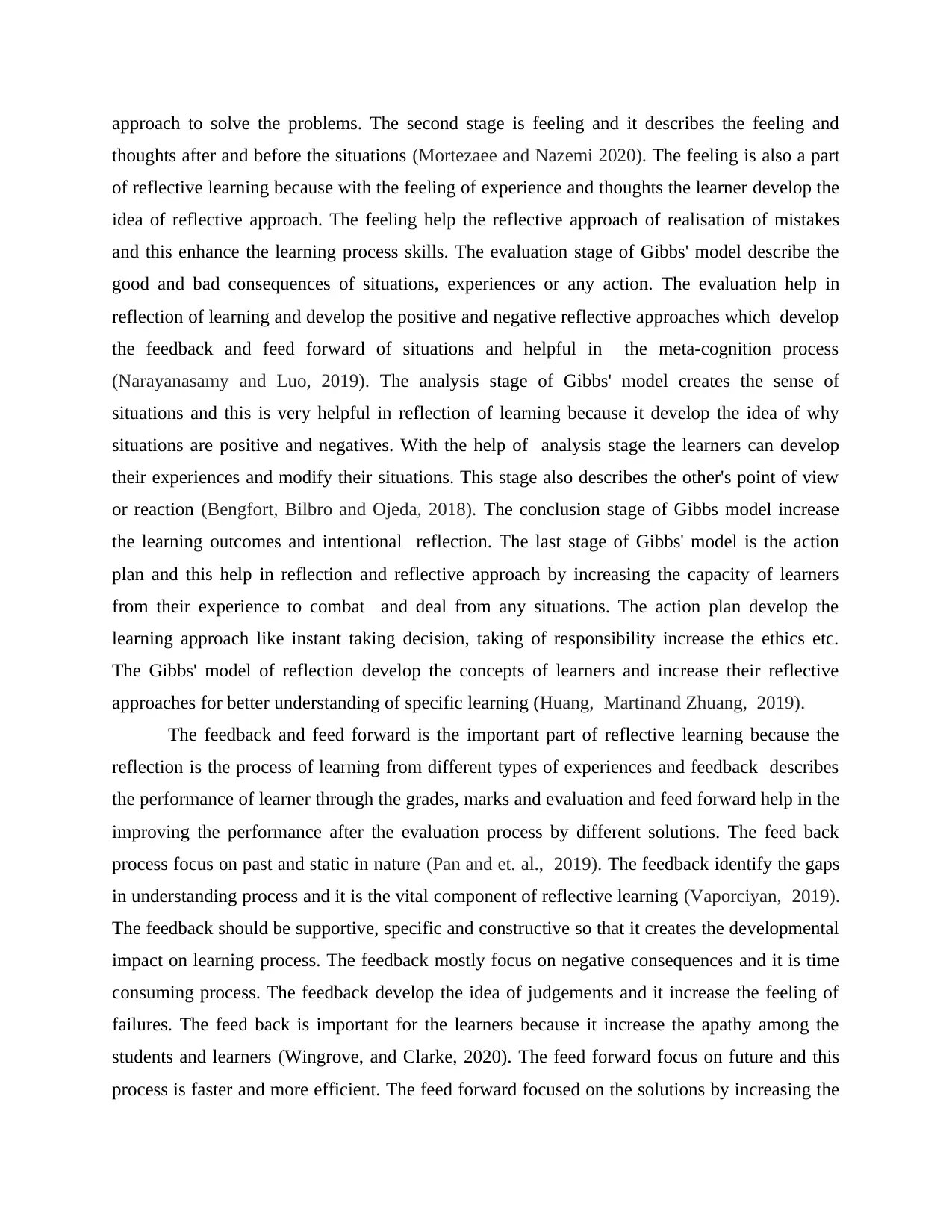
approach to solve the problems. The second stage is feeling and it describes the feeling and
thoughts after and before the situations (Mortezaee and Nazemi 2020). The feeling is also a part
of reflective learning because with the feeling of experience and thoughts the learner develop the
idea of reflective approach. The feeling help the reflective approach of realisation of mistakes
and this enhance the learning process skills. The evaluation stage of Gibbs' model describe the
good and bad consequences of situations, experiences or any action. The evaluation help in
reflection of learning and develop the positive and negative reflective approaches which develop
the feedback and feed forward of situations and helpful in the meta-cognition process
(Narayanasamy and Luo, 2019). The analysis stage of Gibbs' model creates the sense of
situations and this is very helpful in reflection of learning because it develop the idea of why
situations are positive and negatives. With the help of analysis stage the learners can develop
their experiences and modify their situations. This stage also describes the other's point of view
or reaction (Bengfort, Bilbro and Ojeda, 2018). The conclusion stage of Gibbs model increase
the learning outcomes and intentional reflection. The last stage of Gibbs' model is the action
plan and this help in reflection and reflective approach by increasing the capacity of learners
from their experience to combat and deal from any situations. The action plan develop the
learning approach like instant taking decision, taking of responsibility increase the ethics etc.
The Gibbs' model of reflection develop the concepts of learners and increase their reflective
approaches for better understanding of specific learning (Huang, Martinand Zhuang, 2019).
The feedback and feed forward is the important part of reflective learning because the
reflection is the process of learning from different types of experiences and feedback describes
the performance of learner through the grades, marks and evaluation and feed forward help in the
improving the performance after the evaluation process by different solutions. The feed back
process focus on past and static in nature (Pan and et. al., 2019). The feedback identify the gaps
in understanding process and it is the vital component of reflective learning (Vaporciyan, 2019).
The feedback should be supportive, specific and constructive so that it creates the developmental
impact on learning process. The feedback mostly focus on negative consequences and it is time
consuming process. The feedback develop the idea of judgements and it increase the feeling of
failures. The feed back is important for the learners because it increase the apathy among the
students and learners (Wingrove, and Clarke, 2020). The feed forward focus on future and this
process is faster and more efficient. The feed forward focused on the solutions by increasing the
thoughts after and before the situations (Mortezaee and Nazemi 2020). The feeling is also a part
of reflective learning because with the feeling of experience and thoughts the learner develop the
idea of reflective approach. The feeling help the reflective approach of realisation of mistakes
and this enhance the learning process skills. The evaluation stage of Gibbs' model describe the
good and bad consequences of situations, experiences or any action. The evaluation help in
reflection of learning and develop the positive and negative reflective approaches which develop
the feedback and feed forward of situations and helpful in the meta-cognition process
(Narayanasamy and Luo, 2019). The analysis stage of Gibbs' model creates the sense of
situations and this is very helpful in reflection of learning because it develop the idea of why
situations are positive and negatives. With the help of analysis stage the learners can develop
their experiences and modify their situations. This stage also describes the other's point of view
or reaction (Bengfort, Bilbro and Ojeda, 2018). The conclusion stage of Gibbs model increase
the learning outcomes and intentional reflection. The last stage of Gibbs' model is the action
plan and this help in reflection and reflective approach by increasing the capacity of learners
from their experience to combat and deal from any situations. The action plan develop the
learning approach like instant taking decision, taking of responsibility increase the ethics etc.
The Gibbs' model of reflection develop the concepts of learners and increase their reflective
approaches for better understanding of specific learning (Huang, Martinand Zhuang, 2019).
The feedback and feed forward is the important part of reflective learning because the
reflection is the process of learning from different types of experiences and feedback describes
the performance of learner through the grades, marks and evaluation and feed forward help in the
improving the performance after the evaluation process by different solutions. The feed back
process focus on past and static in nature (Pan and et. al., 2019). The feedback identify the gaps
in understanding process and it is the vital component of reflective learning (Vaporciyan, 2019).
The feedback should be supportive, specific and constructive so that it creates the developmental
impact on learning process. The feedback mostly focus on negative consequences and it is time
consuming process. The feedback develop the idea of judgements and it increase the feeling of
failures. The feed back is important for the learners because it increase the apathy among the
students and learners (Wingrove, and Clarke, 2020). The feed forward focus on future and this
process is faster and more efficient. The feed forward focused on the solutions by increasing the
Paraphrase This Document
Need a fresh take? Get an instant paraphrase of this document with our AI Paraphraser
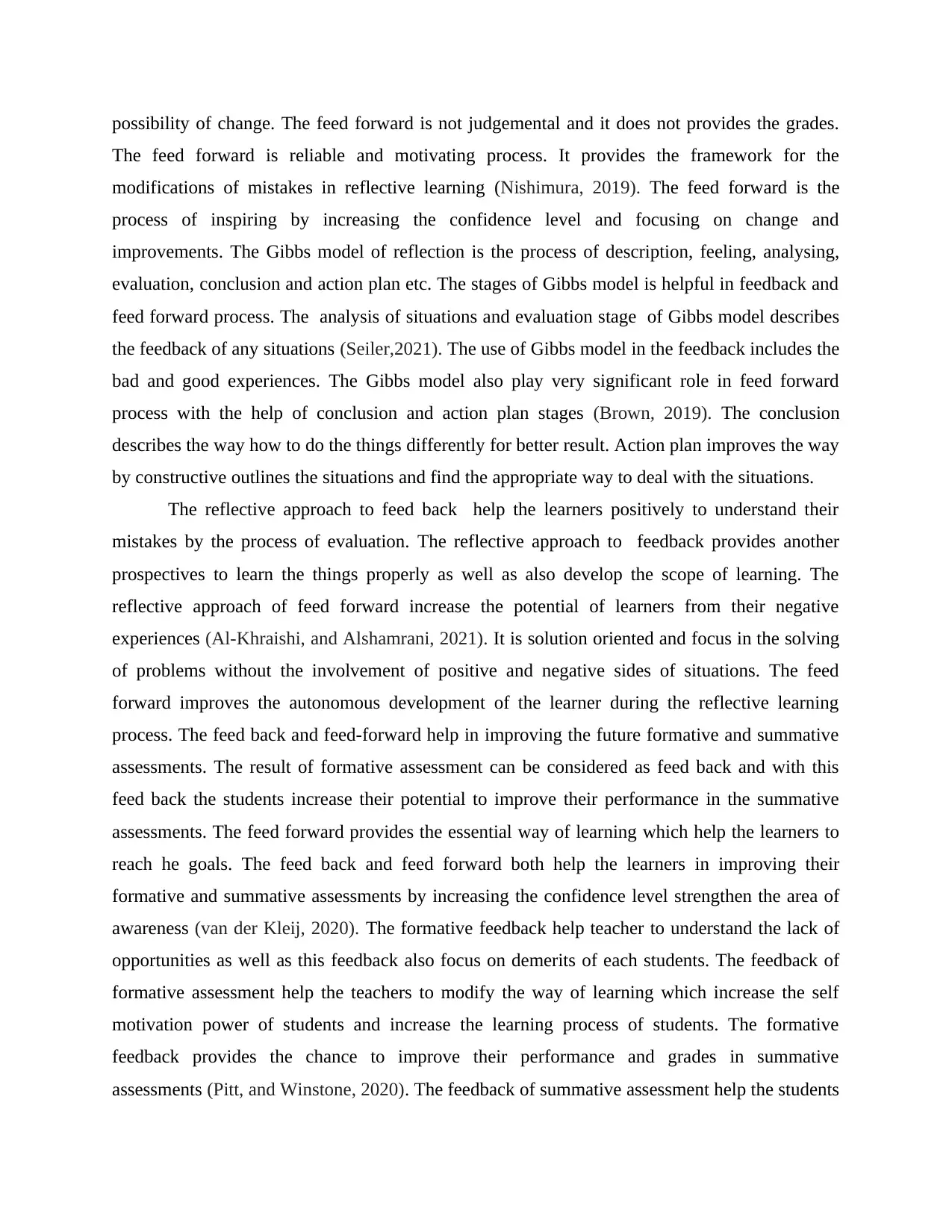
possibility of change. The feed forward is not judgemental and it does not provides the grades.
The feed forward is reliable and motivating process. It provides the framework for the
modifications of mistakes in reflective learning (Nishimura, 2019). The feed forward is the
process of inspiring by increasing the confidence level and focusing on change and
improvements. The Gibbs model of reflection is the process of description, feeling, analysing,
evaluation, conclusion and action plan etc. The stages of Gibbs model is helpful in feedback and
feed forward process. The analysis of situations and evaluation stage of Gibbs model describes
the feedback of any situations (Seiler,2021). The use of Gibbs model in the feedback includes the
bad and good experiences. The Gibbs model also play very significant role in feed forward
process with the help of conclusion and action plan stages (Brown, 2019). The conclusion
describes the way how to do the things differently for better result. Action plan improves the way
by constructive outlines the situations and find the appropriate way to deal with the situations.
The reflective approach to feed back help the learners positively to understand their
mistakes by the process of evaluation. The reflective approach to feedback provides another
prospectives to learn the things properly as well as also develop the scope of learning. The
reflective approach of feed forward increase the potential of learners from their negative
experiences (Al-Khraishi, and Alshamrani, 2021). It is solution oriented and focus in the solving
of problems without the involvement of positive and negative sides of situations. The feed
forward improves the autonomous development of the learner during the reflective learning
process. The feed back and feed-forward help in improving the future formative and summative
assessments. The result of formative assessment can be considered as feed back and with this
feed back the students increase their potential to improve their performance in the summative
assessments. The feed forward provides the essential way of learning which help the learners to
reach he goals. The feed back and feed forward both help the learners in improving their
formative and summative assessments by increasing the confidence level strengthen the area of
awareness (van der Kleij, 2020). The formative feedback help teacher to understand the lack of
opportunities as well as this feedback also focus on demerits of each students. The feedback of
formative assessment help the teachers to modify the way of learning which increase the self
motivation power of students and increase the learning process of students. The formative
feedback provides the chance to improve their performance and grades in summative
assessments (Pitt, and Winstone, 2020). The feedback of summative assessment help the students
The feed forward is reliable and motivating process. It provides the framework for the
modifications of mistakes in reflective learning (Nishimura, 2019). The feed forward is the
process of inspiring by increasing the confidence level and focusing on change and
improvements. The Gibbs model of reflection is the process of description, feeling, analysing,
evaluation, conclusion and action plan etc. The stages of Gibbs model is helpful in feedback and
feed forward process. The analysis of situations and evaluation stage of Gibbs model describes
the feedback of any situations (Seiler,2021). The use of Gibbs model in the feedback includes the
bad and good experiences. The Gibbs model also play very significant role in feed forward
process with the help of conclusion and action plan stages (Brown, 2019). The conclusion
describes the way how to do the things differently for better result. Action plan improves the way
by constructive outlines the situations and find the appropriate way to deal with the situations.
The reflective approach to feed back help the learners positively to understand their
mistakes by the process of evaluation. The reflective approach to feedback provides another
prospectives to learn the things properly as well as also develop the scope of learning. The
reflective approach of feed forward increase the potential of learners from their negative
experiences (Al-Khraishi, and Alshamrani, 2021). It is solution oriented and focus in the solving
of problems without the involvement of positive and negative sides of situations. The feed
forward improves the autonomous development of the learner during the reflective learning
process. The feed back and feed-forward help in improving the future formative and summative
assessments. The result of formative assessment can be considered as feed back and with this
feed back the students increase their potential to improve their performance in the summative
assessments. The feed forward provides the essential way of learning which help the learners to
reach he goals. The feed back and feed forward both help the learners in improving their
formative and summative assessments by increasing the confidence level strengthen the area of
awareness (van der Kleij, 2020). The formative feedback help teacher to understand the lack of
opportunities as well as this feedback also focus on demerits of each students. The feedback of
formative assessment help the teachers to modify the way of learning which increase the self
motivation power of students and increase the learning process of students. The formative
feedback provides the chance to improve their performance and grades in summative
assessments (Pitt, and Winstone, 2020). The feedback of summative assessment help the students
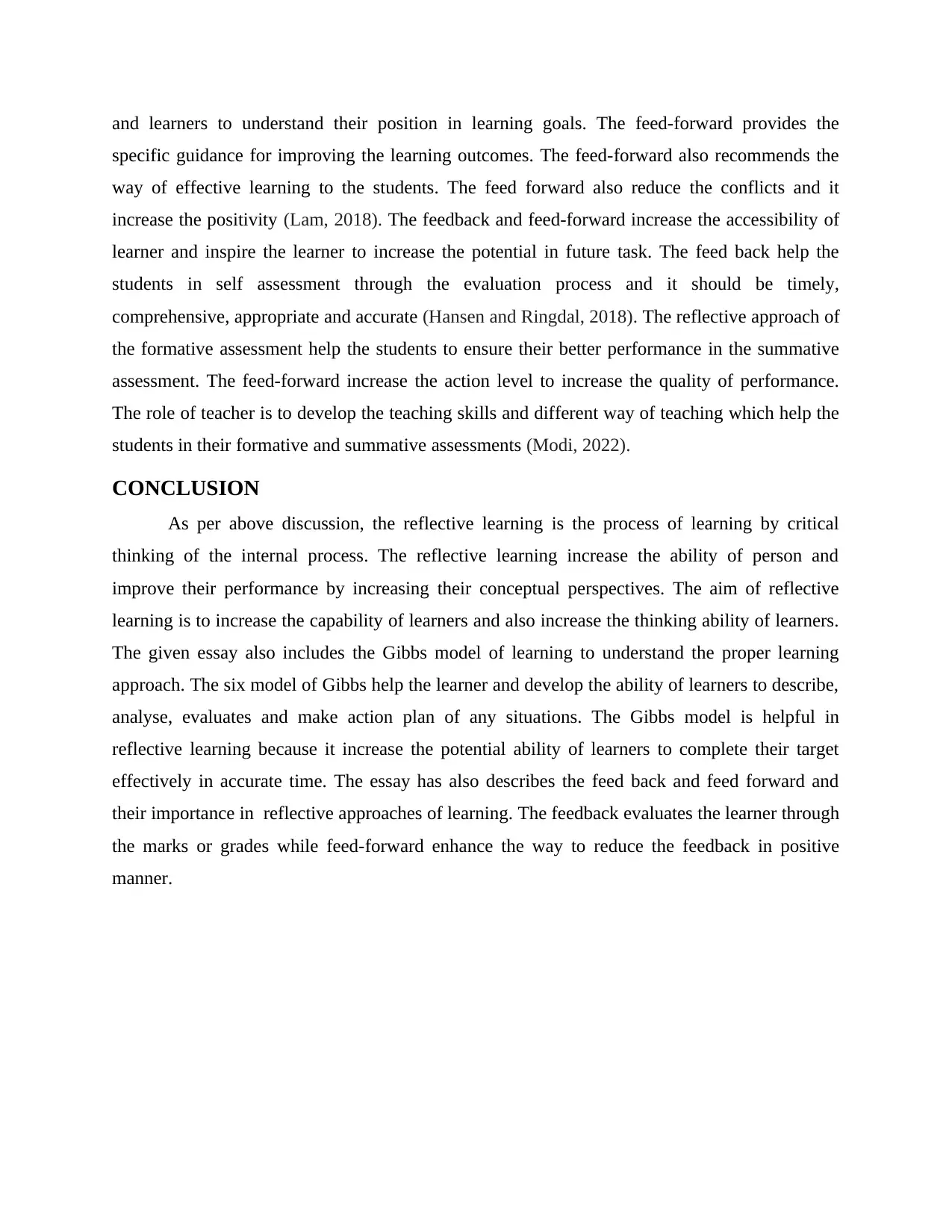
and learners to understand their position in learning goals. The feed-forward provides the
specific guidance for improving the learning outcomes. The feed-forward also recommends the
way of effective learning to the students. The feed forward also reduce the conflicts and it
increase the positivity (Lam, 2018). The feedback and feed-forward increase the accessibility of
learner and inspire the learner to increase the potential in future task. The feed back help the
students in self assessment through the evaluation process and it should be timely,
comprehensive, appropriate and accurate (Hansen and Ringdal, 2018). The reflective approach of
the formative assessment help the students to ensure their better performance in the summative
assessment. The feed-forward increase the action level to increase the quality of performance.
The role of teacher is to develop the teaching skills and different way of teaching which help the
students in their formative and summative assessments (Modi, 2022).
CONCLUSION
As per above discussion, the reflective learning is the process of learning by critical
thinking of the internal process. The reflective learning increase the ability of person and
improve their performance by increasing their conceptual perspectives. The aim of reflective
learning is to increase the capability of learners and also increase the thinking ability of learners.
The given essay also includes the Gibbs model of learning to understand the proper learning
approach. The six model of Gibbs help the learner and develop the ability of learners to describe,
analyse, evaluates and make action plan of any situations. The Gibbs model is helpful in
reflective learning because it increase the potential ability of learners to complete their target
effectively in accurate time. The essay has also describes the feed back and feed forward and
their importance in reflective approaches of learning. The feedback evaluates the learner through
the marks or grades while feed-forward enhance the way to reduce the feedback in positive
manner.
specific guidance for improving the learning outcomes. The feed-forward also recommends the
way of effective learning to the students. The feed forward also reduce the conflicts and it
increase the positivity (Lam, 2018). The feedback and feed-forward increase the accessibility of
learner and inspire the learner to increase the potential in future task. The feed back help the
students in self assessment through the evaluation process and it should be timely,
comprehensive, appropriate and accurate (Hansen and Ringdal, 2018). The reflective approach of
the formative assessment help the students to ensure their better performance in the summative
assessment. The feed-forward increase the action level to increase the quality of performance.
The role of teacher is to develop the teaching skills and different way of teaching which help the
students in their formative and summative assessments (Modi, 2022).
CONCLUSION
As per above discussion, the reflective learning is the process of learning by critical
thinking of the internal process. The reflective learning increase the ability of person and
improve their performance by increasing their conceptual perspectives. The aim of reflective
learning is to increase the capability of learners and also increase the thinking ability of learners.
The given essay also includes the Gibbs model of learning to understand the proper learning
approach. The six model of Gibbs help the learner and develop the ability of learners to describe,
analyse, evaluates and make action plan of any situations. The Gibbs model is helpful in
reflective learning because it increase the potential ability of learners to complete their target
effectively in accurate time. The essay has also describes the feed back and feed forward and
their importance in reflective approaches of learning. The feedback evaluates the learner through
the marks or grades while feed-forward enhance the way to reduce the feedback in positive
manner.
⊘ This is a preview!⊘
Do you want full access?
Subscribe today to unlock all pages.

Trusted by 1+ million students worldwide
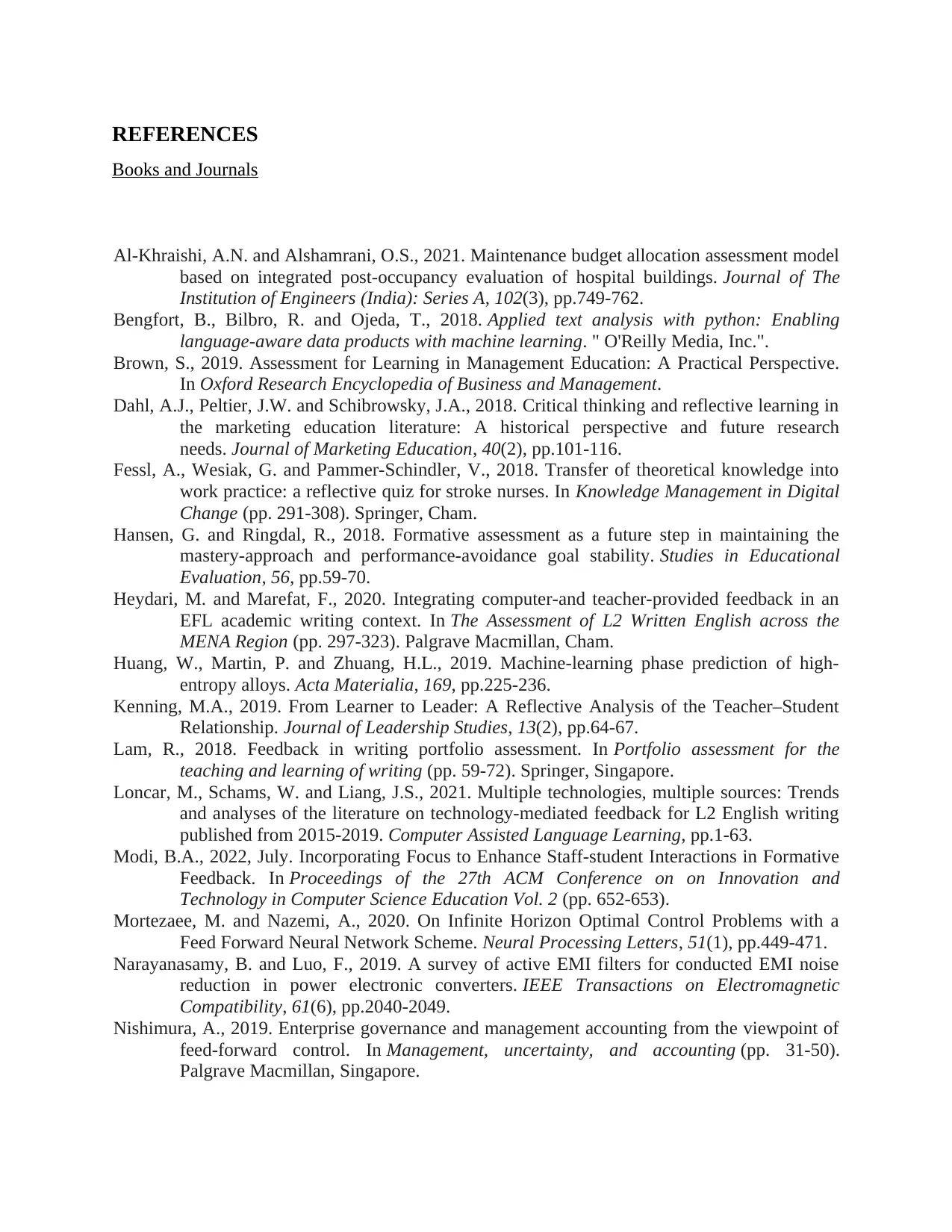
REFERENCES
Books and Journals
Al-Khraishi, A.N. and Alshamrani, O.S., 2021. Maintenance budget allocation assessment model
based on integrated post-occupancy evaluation of hospital buildings. Journal of The
Institution of Engineers (India): Series A, 102(3), pp.749-762.
Bengfort, B., Bilbro, R. and Ojeda, T., 2018. Applied text analysis with python: Enabling
language-aware data products with machine learning. " O'Reilly Media, Inc.".
Brown, S., 2019. Assessment for Learning in Management Education: A Practical Perspective.
In Oxford Research Encyclopedia of Business and Management.
Dahl, A.J., Peltier, J.W. and Schibrowsky, J.A., 2018. Critical thinking and reflective learning in
the marketing education literature: A historical perspective and future research
needs. Journal of Marketing Education, 40(2), pp.101-116.
Fessl, A., Wesiak, G. and Pammer-Schindler, V., 2018. Transfer of theoretical knowledge into
work practice: a reflective quiz for stroke nurses. In Knowledge Management in Digital
Change (pp. 291-308). Springer, Cham.
Hansen, G. and Ringdal, R., 2018. Formative assessment as a future step in maintaining the
mastery-approach and performance-avoidance goal stability. Studies in Educational
Evaluation, 56, pp.59-70.
Heydari, M. and Marefat, F., 2020. Integrating computer-and teacher-provided feedback in an
EFL academic writing context. In The Assessment of L2 Written English across the
MENA Region (pp. 297-323). Palgrave Macmillan, Cham.
Huang, W., Martin, P. and Zhuang, H.L., 2019. Machine-learning phase prediction of high-
entropy alloys. Acta Materialia, 169, pp.225-236.
Kenning, M.A., 2019. From Learner to Leader: A Reflective Analysis of the Teacher–Student
Relationship. Journal of Leadership Studies, 13(2), pp.64-67.
Lam, R., 2018. Feedback in writing portfolio assessment. In Portfolio assessment for the
teaching and learning of writing (pp. 59-72). Springer, Singapore.
Loncar, M., Schams, W. and Liang, J.S., 2021. Multiple technologies, multiple sources: Trends
and analyses of the literature on technology-mediated feedback for L2 English writing
published from 2015-2019. Computer Assisted Language Learning, pp.1-63.
Modi, B.A., 2022, July. Incorporating Focus to Enhance Staff-student Interactions in Formative
Feedback. In Proceedings of the 27th ACM Conference on on Innovation and
Technology in Computer Science Education Vol. 2 (pp. 652-653).
Mortezaee, M. and Nazemi, A., 2020. On Infinite Horizon Optimal Control Problems with a
Feed Forward Neural Network Scheme. Neural Processing Letters, 51(1), pp.449-471.
Narayanasamy, B. and Luo, F., 2019. A survey of active EMI filters for conducted EMI noise
reduction in power electronic converters. IEEE Transactions on Electromagnetic
Compatibility, 61(6), pp.2040-2049.
Nishimura, A., 2019. Enterprise governance and management accounting from the viewpoint of
feed-forward control. In Management, uncertainty, and accounting (pp. 31-50).
Palgrave Macmillan, Singapore.
Books and Journals
Al-Khraishi, A.N. and Alshamrani, O.S., 2021. Maintenance budget allocation assessment model
based on integrated post-occupancy evaluation of hospital buildings. Journal of The
Institution of Engineers (India): Series A, 102(3), pp.749-762.
Bengfort, B., Bilbro, R. and Ojeda, T., 2018. Applied text analysis with python: Enabling
language-aware data products with machine learning. " O'Reilly Media, Inc.".
Brown, S., 2019. Assessment for Learning in Management Education: A Practical Perspective.
In Oxford Research Encyclopedia of Business and Management.
Dahl, A.J., Peltier, J.W. and Schibrowsky, J.A., 2018. Critical thinking and reflective learning in
the marketing education literature: A historical perspective and future research
needs. Journal of Marketing Education, 40(2), pp.101-116.
Fessl, A., Wesiak, G. and Pammer-Schindler, V., 2018. Transfer of theoretical knowledge into
work practice: a reflective quiz for stroke nurses. In Knowledge Management in Digital
Change (pp. 291-308). Springer, Cham.
Hansen, G. and Ringdal, R., 2018. Formative assessment as a future step in maintaining the
mastery-approach and performance-avoidance goal stability. Studies in Educational
Evaluation, 56, pp.59-70.
Heydari, M. and Marefat, F., 2020. Integrating computer-and teacher-provided feedback in an
EFL academic writing context. In The Assessment of L2 Written English across the
MENA Region (pp. 297-323). Palgrave Macmillan, Cham.
Huang, W., Martin, P. and Zhuang, H.L., 2019. Machine-learning phase prediction of high-
entropy alloys. Acta Materialia, 169, pp.225-236.
Kenning, M.A., 2019. From Learner to Leader: A Reflective Analysis of the Teacher–Student
Relationship. Journal of Leadership Studies, 13(2), pp.64-67.
Lam, R., 2018. Feedback in writing portfolio assessment. In Portfolio assessment for the
teaching and learning of writing (pp. 59-72). Springer, Singapore.
Loncar, M., Schams, W. and Liang, J.S., 2021. Multiple technologies, multiple sources: Trends
and analyses of the literature on technology-mediated feedback for L2 English writing
published from 2015-2019. Computer Assisted Language Learning, pp.1-63.
Modi, B.A., 2022, July. Incorporating Focus to Enhance Staff-student Interactions in Formative
Feedback. In Proceedings of the 27th ACM Conference on on Innovation and
Technology in Computer Science Education Vol. 2 (pp. 652-653).
Mortezaee, M. and Nazemi, A., 2020. On Infinite Horizon Optimal Control Problems with a
Feed Forward Neural Network Scheme. Neural Processing Letters, 51(1), pp.449-471.
Narayanasamy, B. and Luo, F., 2019. A survey of active EMI filters for conducted EMI noise
reduction in power electronic converters. IEEE Transactions on Electromagnetic
Compatibility, 61(6), pp.2040-2049.
Nishimura, A., 2019. Enterprise governance and management accounting from the viewpoint of
feed-forward control. In Management, uncertainty, and accounting (pp. 31-50).
Palgrave Macmillan, Singapore.
Paraphrase This Document
Need a fresh take? Get an instant paraphrase of this document with our AI Paraphraser
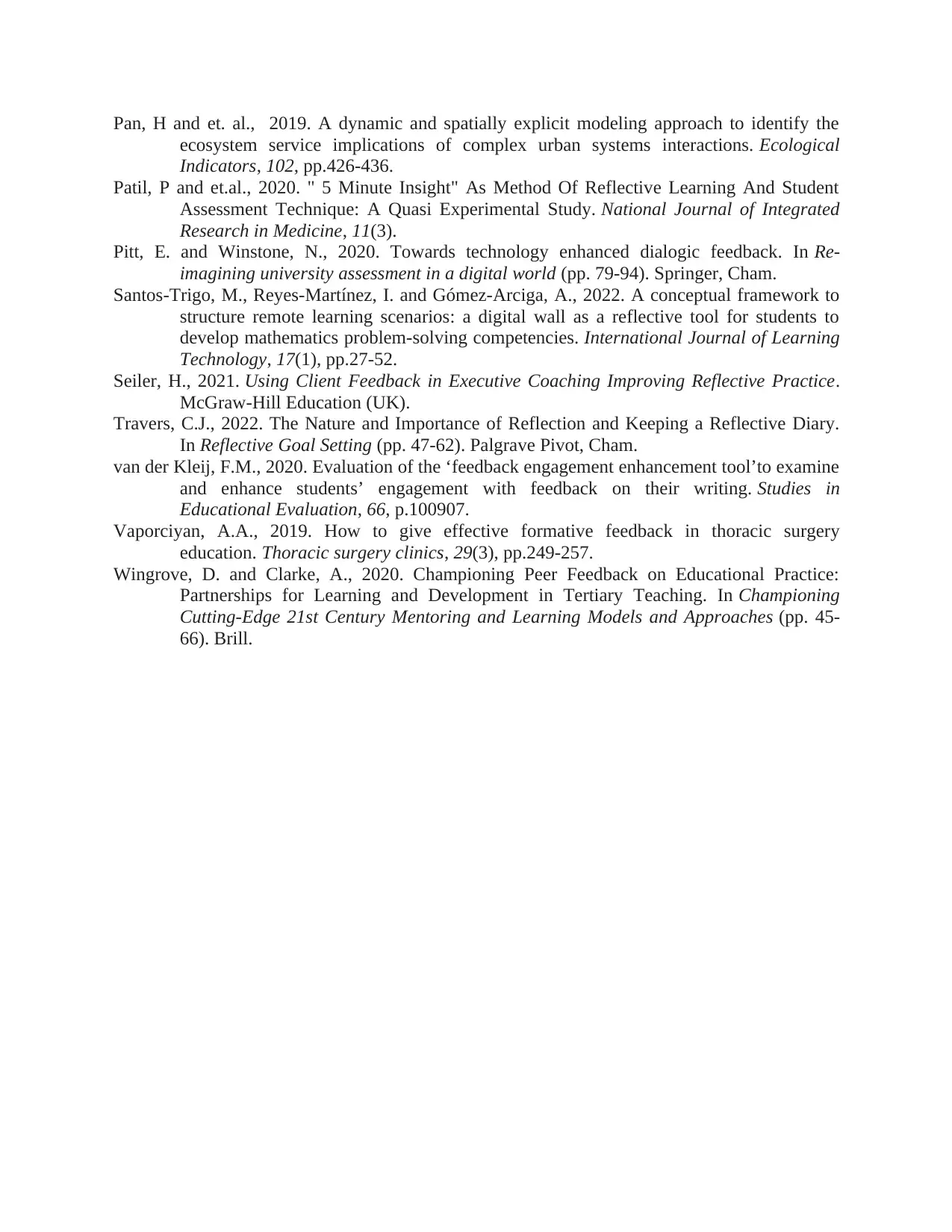
Pan, H and et. al., 2019. A dynamic and spatially explicit modeling approach to identify the
ecosystem service implications of complex urban systems interactions. Ecological
Indicators, 102, pp.426-436.
Patil, P and et.al., 2020. " 5 Minute Insight" As Method Of Reflective Learning And Student
Assessment Technique: A Quasi Experimental Study. National Journal of Integrated
Research in Medicine, 11(3).
Pitt, E. and Winstone, N., 2020. Towards technology enhanced dialogic feedback. In Re-
imagining university assessment in a digital world (pp. 79-94). Springer, Cham.
Santos-Trigo, M., Reyes-Martínez, I. and Gómez-Arciga, A., 2022. A conceptual framework to
structure remote learning scenarios: a digital wall as a reflective tool for students to
develop mathematics problem-solving competencies. International Journal of Learning
Technology, 17(1), pp.27-52.
Seiler, H., 2021. Using Client Feedback in Executive Coaching Improving Reflective Practice.
McGraw-Hill Education (UK).
Travers, C.J., 2022. The Nature and Importance of Reflection and Keeping a Reflective Diary.
In Reflective Goal Setting (pp. 47-62). Palgrave Pivot, Cham.
van der Kleij, F.M., 2020. Evaluation of the ‘feedback engagement enhancement tool’to examine
and enhance students’ engagement with feedback on their writing. Studies in
Educational Evaluation, 66, p.100907.
Vaporciyan, A.A., 2019. How to give effective formative feedback in thoracic surgery
education. Thoracic surgery clinics, 29(3), pp.249-257.
Wingrove, D. and Clarke, A., 2020. Championing Peer Feedback on Educational Practice:
Partnerships for Learning and Development in Tertiary Teaching. In Championing
Cutting-Edge 21st Century Mentoring and Learning Models and Approaches (pp. 45-
66). Brill.
ecosystem service implications of complex urban systems interactions. Ecological
Indicators, 102, pp.426-436.
Patil, P and et.al., 2020. " 5 Minute Insight" As Method Of Reflective Learning And Student
Assessment Technique: A Quasi Experimental Study. National Journal of Integrated
Research in Medicine, 11(3).
Pitt, E. and Winstone, N., 2020. Towards technology enhanced dialogic feedback. In Re-
imagining university assessment in a digital world (pp. 79-94). Springer, Cham.
Santos-Trigo, M., Reyes-Martínez, I. and Gómez-Arciga, A., 2022. A conceptual framework to
structure remote learning scenarios: a digital wall as a reflective tool for students to
develop mathematics problem-solving competencies. International Journal of Learning
Technology, 17(1), pp.27-52.
Seiler, H., 2021. Using Client Feedback in Executive Coaching Improving Reflective Practice.
McGraw-Hill Education (UK).
Travers, C.J., 2022. The Nature and Importance of Reflection and Keeping a Reflective Diary.
In Reflective Goal Setting (pp. 47-62). Palgrave Pivot, Cham.
van der Kleij, F.M., 2020. Evaluation of the ‘feedback engagement enhancement tool’to examine
and enhance students’ engagement with feedback on their writing. Studies in
Educational Evaluation, 66, p.100907.
Vaporciyan, A.A., 2019. How to give effective formative feedback in thoracic surgery
education. Thoracic surgery clinics, 29(3), pp.249-257.
Wingrove, D. and Clarke, A., 2020. Championing Peer Feedback on Educational Practice:
Partnerships for Learning and Development in Tertiary Teaching. In Championing
Cutting-Edge 21st Century Mentoring and Learning Models and Approaches (pp. 45-
66). Brill.
1 out of 8
Related Documents
Your All-in-One AI-Powered Toolkit for Academic Success.
+13062052269
info@desklib.com
Available 24*7 on WhatsApp / Email
![[object Object]](/_next/static/media/star-bottom.7253800d.svg)
Unlock your academic potential
Copyright © 2020–2026 A2Z Services. All Rights Reserved. Developed and managed by ZUCOL.





